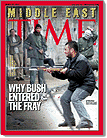Quotes of the Day

![]() The only Israeli-Palestinian dialogue underway on the third anniversary of the current intifadeh last Monday took place in a Tel Aviv courtroom. There, the 43-year-old West Bank Fatah leader Marwan Barghouti delivered closing arguments in his own defense on charges of murder and terrorism arising out of the three-year uprising that has claimed the lives of 800 Israelis and 2,600 Palestinians.
The only Israeli-Palestinian dialogue underway on the third anniversary of the current intifadeh last Monday took place in a Tel Aviv courtroom. There, the 43-year-old West Bank Fatah leader Marwan Barghouti delivered closing arguments in his own defense on charges of murder and terrorism arising out of the three-year uprising that has claimed the lives of 800 Israelis and 2,600 Palestinians.
Barghouti, whose "Tanzim" militia, and their al-Aqsa Martyr's Brigade offshoot, have been at the heart of Palestinian armed actions against Israel over the past three years, is a leading candidate to eventually succeed Yasser Arafat as national leader of the Palestinians. He did not bother to answer the charges against him, dismissing the court's right to even try a non-citizen such as himself. Instead, he delivered his own indictment of Israel's occupation of the West Bank and Gaza, reiterated his pride in the intifada, and warned that if Israel was not prepared to move quickly to a two-state solution it would have to find a way to live with a Palestinian majority in a single state.
There also seemed to be a message for President Bush in Barghouti's address, when he warned that "a man cannot be a Palestinian leader if he does not fight the occupation." The Bush administration has made sidelining Arafat a key precondition for any resumption of talks, but Barghouti insisted that even if Arafat was removed, the only Palestinians with the credibility to lead — and to put a stop to Palestinian violence — are those who have taken an active part in the Palestinian struggle. He should know. Despite being incarcerated in Israel, Barghouti is widely credited with having played a leading role in orchestrating the 45-day cease-fire among Palestinian groups, which collapsed last month in a wave of Palestinian terror attacks and Israeli assassinations.
Israelis aren't much interested in what Barghouti has to say anyway. Their priorities are protecting themselves from terror attacks and surviving in an economy wheezing under the burden of three years of a war for which they hold Barghouti as second only to Arafat in culpability. Their focus is not on negotiations but on building a wall that will separate them from the Palestinian areas on the West Bank that produce most of the suicide bombers attacking Israel. Despite U.S. concerns that the wall may create a de facto border deep inside the West Bank that would imperil prospects for achieving agreement on a two-state separation, the government of Prime Minister Ariel Sharon affirmed its intention Wednesday, to press ahead with the next phase of the project. The only concession to Washington's concerns was the decision to leave a gap between two strands of fence around the settlement of Ariel, 12 miles inside the West Bank. The gap will, no doubt be closed at a more opportune time — which Hamas or one of the other Palestinian militant groups will no doubt obligingly provide in the form of some new terrorist carnage in an Israeli city.
The tally of three bloody years
|
|
||
|
|
 March 25, 2002  April 8, 2002  Oct. 23, 2000 |
|
|
|
||
|
|
|
|
|
|
||
Three years into the intifada, the violent stalemate persists. For Israel, some months are bloodier; others are comparatively quiet — but that is always short-lived, the certainty ever-present that more terror will come despite the best efforts of Israel's security forces. For the Palestinians, too, some months are worse than others, but even in times of relative calm there is the strangulation of social and economic life resulting from the occupation and its security measures. The Israeli economy is in decline; the Palestinian economy has all but ceased to function, leaving upward of 60 percent of the population living below the poverty line. Worse news, for both sides, is that there is no visible prospect for the foreseeable future of breaking the malignant impasse.
The U.S. and Israel insist that the Palestinians sideline Arafat, and warn that they'll work with the new government of Prime Minister Ahmed Qureia only if it goes to war with Hamas, Islamic Jihad and the al-Aqsa Martyr's Brigade. But Qureia has already warned that the insistence on dispatching Arafat, who remains the elected leader of the Palestinians, will imperil any prospects for progress. Nor is he any more likely than his predecessor, the hapless Mahmoud Abbas, to seek confrontation with the militant groups. Like his predecessor, he will seek a truce by consensus among the Palestinian factions.
Many Palestinian leaders — not only those around Abbas, but also many of those around Qureia — believe the three-year armed intifadeh has been a tragic mistake that has taken the Palestinian cause to the brink of a defeat every bit as catastrophic for their people as their expulsion from Israel in 1948 and the defeat of the Arab armies in 1967 that saw Israel take control of the West Bank and Gaza. In the opening months of the current intifada, when Palestinians died in far higher numbers as they confronted occupation forces with stones or rifles, international opinion was solidly behind the Palestinians and Israel was isolated. But within six months, the signature tactic of the "armed intifada" had become suicide terror inside Israel's cities, and that profoundly changed the dynamic — on the one hand, it brought the Israeli casualty figure far closer to the Palestinian equivalent, satisfying a hunger for vengeance among Palestinians, but at a heavy political price. Some of the militants had hoped that the rising death toll would provoke a crisis in Israel and force a withdrawal from the West Bank in the same way that Hezbollah's 20-year war of attrition had eventually forced Israel to quit southern Lebanon. Instead, the wave of terror dealt a mortal blow to the Israeli peace camp, propelling Ariel Sharon — a hard-line opponent of the peace process — from the political margins to the office of Prime Minister, ending all further discussions on a final-status deal to complete the Oslo process.
Under Sharon's stewardship, Israel's focus became achieving a military victory over the Palestinian uprising. Sharon would achieve peace, he promised Israelis, by lowering Palestinian expectations and rendering unbearable the cost of rebellion. But even as Sharon piled on the collective punishment of the Palestinian population, the suicide bombings provoked such international revulsion that the Palestinians found themselves in diplomatic free fall, plummeting even faster following the September 11 attacks. Suicide bombings played into Sharon's hands, allowing him to define the conflict between Israel and the Palestinians as first and foremost an issue of terrorism, which had become the prism through which the Bush administration was inclined to view the world. And where the administration had started out emphasizing a link between achieving a cease-fire and resuming political negotiations — on the grounds that without a "political horizon" for ending it, the occupation itself would continue to generate violence — the suicide terror attacks helped Sharon persuade Washington to adopt his own position that there could be no talks about ending the occupation before Palestinian violence was ended.
Although his hard-line tactics failed to bring Israel the security he promised, Sharon was reelected last year with an even stronger mandate. His closest challengers today come from within his own party — finance minister Benjamin Netanyahu, foreign minister Silvan Shalom — and the Labor Party is in decline and disarray. Conventional wisdom even in the center of the Israeli spectrum now holds that Oslo was a tragic mistake.
The hardening of Israeli hearts was mirrored on the Palestinian side, of course, where Hamas, too, moved from the margins into the mainstream. In 1996, Arafat ordered a hundreds of arrests of Hamas activists to stop a wave of bus bombings inside Israel, and made clear that he would not tolerate the organization attacking Israelis over his head. These days, Arafat's envoys hold polite negotiations with Hamas in the hope of forging a consensus over a cease-fire; Hamas, more often than not, demurs. And nobody expects that the security forces of the Palestinian Authority, whose members have fought shoulder-to-shoulder with gunmen from Hamas and other groups against Israeli incursions, are likely to turn their guns on their erstwhile comrades in order to achieve security for Israel.
What now?
In the early days of Oslo when Hamas continued to mount terror attacks, Prime Minister Yitzhak Rabin famously insisted that Israel would "pursue peace as if there was no terrorism, and fight terrorism as if there was no peace." Today, some Palestinian leaders such as Abbas and his security chief Muhammed Dahlan believe it's the Palestinians' turn, and that their cause will be lost unless they fight terrorism as if there was no occupation. But Abbas tried and failed — not only because Arafat was determined to sabotage him, but also because the fate of the Palestinians' "hudna" cease-fire showed that the rank and file fighters of Hamas, Islamic Jihad and the various Fatah militias are simply not prepared to accept a unilateral truce that brings little basic changes in the conditions of occupation.
The hardships and hatreds engendered by three years of bloodletting and the absence of any significant progress toward a political solution has strengthened the hand of rejectionists on both sides. Israelis point to ongoing Palestinian terror attacks and insist there can be no political concessions or even dialogue. Instead, they are girding for a long-term siege of Palestinian population centers on the West Bank that they hope will eventually break the Palestinians will to resist. The Palestinians believe Israel was never serious about ending the occupation or withdrawing its settlements, and those counseling against violence have little to show for diplomacy. The men of violence believe the Palestinians have little to lose, now, but that the cost of the war of attrition must eventually break the will of the Israelis to maintain the occupation.
Still, neither side has been able to impose its will by force of arms. Israeli society has not buckled under the weight of the terror assault and demanded that its leaders withdraw from the West Bank; instead it has become more resolute in support of Sharon's tactics. But those tactics — from assassinations to massive military incursions, closures and economic strangulation — have neither eliminated the terror threat nor altered the fundamental political demands of even the most moderate Palestinian leaders.
Drawing borders
Sharon had hoped the combination of military, economic and diplomatic pressure would lower Palestinian expectations and force them to settle for less than had been offered by the previous Israeli government of Ehud Barak. That hasn't happened. Political negotiations have not been held since the Taba talks a month before Sharon's election, but the basic expectations of the Palestinian leadership remain unchanged. Abbas may have disagreed with Arafat and other Palestinian leaders over their tolerance for violence, but like those around Arafat his view of a political settlement is based on the proposals broadly agreed at Taba — Israeli retreat to a modified version of its 1967 borders, withdrawal of settlements, a creative interpretation of sovereignty to allow both sides to call Jerusalem their capital, and addressing the plight of Palestinian refugees principally via financial compensation and granting them the right to settle in the future Palestinian state.
If the Taba deal remains the minimum acceptable to the Palestinians, it's way beyond where Sharon has signaled he's willing to go. The Prime Minister had opposed Oslo because it pointed inexorably towards Israel ceding control of the West Bank, Gaza and Jerusalem's Arab neighborhoods, which Sharon believed would put Israel in mortal danger. In the 1980s, he had touted his own solutions involving Palestinians in the West Bank cities being given "autonomy" at the local level, while Israel would control the land all around them. And that, in essence, is the current situation. Israel controls most of the West Bank; what's left of the Palestinian Authority — and the welfare wing of Hamas — handles the civil administration in the cities.
The map of Palestinian population centers surrounded by Israeli soldiers and settlers appears to be guiding the construction of the "security fence." Sharon has displayed a Clintonesque ability to borrow the most popular ideas of his domestic opponents in embracing the fence proposal, which had originated in the Labor Party. Labor, of course, wanted it built along the "Green Line" that marks the 1967 border between Israel and the West Bank — with the settlements on the outside. The fact that the fence would be a de facto border was not seen as a problem by Labor, precisely because it would broadly follow the Taba map. But Sharon and his right-wing political base initially rejected the idea, having no intention of giving up on the settlements. But the idea was supported by two thirds of Israel's electorate, as a means of keeping out suicide bombers. So he ordered it built according to his own map, not between Israel and the West Bank but around the Palestinian population centers that comprise around 40 percent of the West Bank — a topography that Washington realizes makes nonsense of the idea of a viable Palestinian state.
Indeed, many observers on both sides of the fence suggest that its construction severely erodes prospects for a two-state solution. That leaves Jews and Palestinians living, as they do to all intents and purposes right now, in a single political entity running from the Jordan River to the Mediterranean. And the majority population in that single entity will soon be the Palestinian, despite the fact that they have no rights of citizenship. That, U.S. officials have warned, will destroy Israel's Jewish and democratic character, codifying what Israeli peaceniks see as an apartheid arrangement as untenable as it is unjust.
The bad news: More to come
For now, however, there are no signs of any intervention to reverse the perilous drift in the situation. Left to their own devices, recent events have shown that the two sides between them will almost certainly consign President Bush's "roadmap" to the burgeoning archive of failed peace proposals. The momentum and ferocity of their combat will ebb and flow, as it has done over the past three years, but without achieving a qualitative transformation of the situation. Both sides know that the only intervention that can significantly transform the situation would have to come from the United States, and yet neither side expects to see much out of Washington in an election year. So it's a relatively safe bet, at the end of the third year of the intifadeh, that there will be a fourth year.
![]()
- Tony Karon
- After three years of intifada escalation, the basic architecture of the conflict remains unchanged. But prospects for a two-state solution are growing fainter